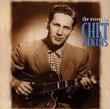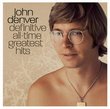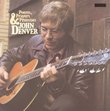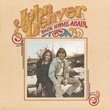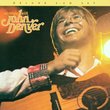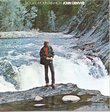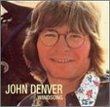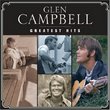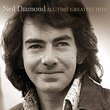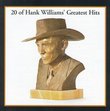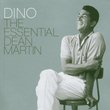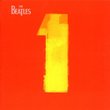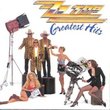| All Artists: John Denver Title: John Denver's Greatest Hits Members Wishing: 0 Total Copies: 0 Label: Bmg Marketing Release Date: 6/7/2005 Album Type: Original recording remastered Genres: Country, Folk, Pop, Rock Styles: Singer-Songwriters, Soft Rock, Oldies, Folk Rock, Country Rock Number of Discs: 1 SwapaCD Credits: 1 Other Editions: Greatest Hits UPC: 828766937626 |
Search - John Denver :: John Denver's Greatest Hits
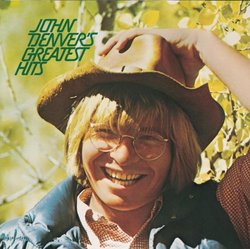 | John Denver John Denver's Greatest Hits Genres: Country, Folk, Pop, Rock
John Denver, John Denver's Greatest Hits |
Larger Image |
CD DetailsSynopsis
Album Description John Denver, John Denver's Greatest Hits Similar CDs
Similarly Requested CDs
|
CD ReviewsMore than just a compliation... ewomack | MN USA | 11/26/2006 (4 out of 5 stars) "Long after his untimely death in 1997, John Denver's songs continue to flicker through America's collective unconscious. Everyone, even the hip hop generation, can sing "Take me Home, Country Roads" and "Rocky Mountain High." Time has actually treated the oft-maligned Denver, born Henry John Deutschendorf, Jr., rather well. Stripped of the 1970s music culture that derided him as sappy, corny, hokey, shallow, and the essence of uncool, his songs can finally speak for themselves. The era of "art" and "glam" rock had no patience for a "high on life" grinning ear-to-ear songwriter who, to them, resembled the Marlboro Man's disowned hippy son. He got it from all sides. After climbing up the rock/pop charts, Denver soon began to score on the country charts. He became a crossover phenomenon, which meant, in his case, that neither the rock/pop nor the country music communities accepted him. Like usurped royalty they watched as his albums sold millions. No album of Denver's outsold "John Denver's Greatest Hits." According to the RIAA, it has sold over nine million copies in the United States and still occupies a spot on their top 100 all-time best selling albums list. But its title remains a slight misnomer. At the time of its release in 1973 only four of the album's eleven songs really qualified as "hits." The others had appeared on his then neglected first three albums, released between 1969 and 1970. Those nonstarters nearly ended his career with a splat. Then, a miracle. The final album of his four album contract, 1971's "Poems, Prayers, and Promises," included the now archetypal "Take Me Home, Country Roads." In a flash Denver became ubiquitous. Another gargantuan hit followed in 1972, "Rocky Mountain High," that solidfied the Cheshire Cat nature boy as a major celebrity. The fuse was lit. "Sunshine On My Shoulder" soared to number one in 1974, outdoing both "Country Roads" and "Rocky Mountain High," following the release of this "Greatest Hits" compilation. Self-fulfilling prophecy, indeed. The remaining qualifying "hit", "Leaving On a Jet Plane," wasn't even a John Denver hit. Though he wrote the song, it was Peter, Paul and Mary that launched it up the charts in 1967. He recorded it for his first solo album, 1969's "Rhymes & Reasons," but the album went nowhere. Paradoxically, regardless of the fact that this "Greatest Hits" album only contains a few actual "hits," the album nonetheless remains Denver's biggest hit album. Not only that, Denver actually re-recorded many of the older songs specifically for this collection. As he says in the apologetic liner notes: "I felt that some of these songs had grown a bit, that I am singing better than I was four or five years ago, and that I would like to treat some of the songs a little differently than I had in the original recordings." This very unorthodox, and unprecedented, approach to a greatest hits collecton gives the album a very consistent sound. Instead of a creating a collage of styles and production values, Denver essentially constructed an entirely new album. This allowed the once neglected songs to take on a new life. He made them sound like hits. The songs on this album capture the sound and feel of their era. Just listen. A mere nanosecond of "Country Roads" has enough potency to evoke now whispy images of dark paneled walls with moving waterfall beer signs, oversaturated technicolor landscapes, three-channel television playing documentaries on Sasquatch and Nessie, ubiquitous ashtrays, wide aisled department store dreams, and analog living standards. "Rocky Mountain High" contains enough Americana one can almost imagine Woody Guthrie singing it. Almost. The 1970s would not have sounded the same without John Denver, which, though some may have preferred, detractors cannot deny. John Denver remains one of the most adored and satirized singer songwriters in recent memory. He had the "honor" of being strangled on a Monty Python Record (resulting in a defamation lawsuit that he won), as well as being honored with numerous awards and tributes following his accidental death. He even embraced conservation long before it went mainstream. "Greatest Hits" captures his career on the early upswing, but not quite at its peak. He continued to dominate the radio and television airwaves throughout the 1970s. "Greatest Hits Volume II" continues the story." John Denver's soaring hymns to nature and humanity Lawrance M. Bernabo | The Zenith City, Duluth, Minnesota | 06/10/2005 (5 out of 5 stars) "Whenever I head west and drive through the mountains, this is the CD I want to listen to. It might seem an obvious link, John Denver's music and the Rocky Mountains, but it is nonetheless appropriate. For some reason "Rocky Mountain High," "Starwood in Aspen," and "The Eagle and the Hawk" sound better at higher altitudes. These eleven songs are those Denver said were most requested in his concerts, but also "Rhymes and Reasons," which he considered having his best lyrics and which is my favorite on the album. Denver had been recording his own songs for only a short time, not really long enough of a period to justify a greatest hits collection, but these were the songs that defined John Denver and his music to the world. This greatest hits album is somewhat unusual because Denver rerecorded many of the songs, explaining that he felt he was signing better and that he wanted to do something a little different with some of these songs than he had in the original versions. The improvements are noticeable, as is Denver's growth as a songwriter from his earliest hits, "Leaving on a Jet Plane" and "Take Me Home, Country Roads" (where, to be fair, he was the third of three writers) to his later works such as "Poems, Prayers and Promises." Recording their most popular songs would not make sense for a lot of artists, but it is hard to argue with the results in this particular instance. This 1974 collection sold over ten million copies worldwide, and remained on the Billboard charts for over two years making it all the way to the top for a while. Technically only a couple of these songs are legitimate hits, with "Sunshine On My Shoulders" making it to #1 and "Rocky Mountain High" to #9, but that is besides to the point ("John Denver's Greatest Hits, Volume 2" has more "hits," but this is the better collection). Listen again to these lyrics and you will get the sense of how these are songs are hymns about the glories of nature and the depths of human relationships. There is not a bad song on this album and listening to it will always make you feel better." It's A Long Way From LA to Denver John P. Morgan | Beautiful San Dimas, CA | 02/14/2007 (5 out of 5 stars) "In 1974, my fourth grade teacher told us that on the last day of school we could bring a record of our choosing and we would listen to it while we had our end-of-school-celebration. You probably couldn't get away with doing that now because some fourth grader might bring Limp Bizket or Korn to to the party...kids these days...but in '74, there was some pretty innocuous music going on. My friend brought Jim Croce, another friend brought some Stevie Wonder, and this girl that I was absolutely crazy about brought this particular album.
The thing that was so great about John Denver was that he was a very accomplished musician and knew how to elicit some pretty strong emotions with his music. A lot of people think his music was just sweet without much substance, it was sweet but it was always on the border of being just a little bit sad, as well. I guess that is called 'bittersweet'. For example, Sunshine. What a great song. It's so simple. It's about the sun. Do we even think about the sun? Do we even realize what a blessing it is? Did you know that if the sun was just a little bit closer we'd burn to a crisp or if it was just a little bit farther away, it would be too cold for the earth to sustain life? But this is just a touching little song about the beauty of the sun and how good it feels to be in the sunshine. Simple. Nice. Touching. And then Poems, Prayers, and Promises. It's just about being with good friends...and, uhhhh "passing the pipe around"...but y'know, it's okay, it's John Denver. I mean, at least he wasn't all tatted out and had a bone through his nose. And then there's Leaving On A Jet Plane. Now when I was nine, I didn't realize the heaviness of this song. Brother, this is a sad, sad song and yet in typical Denver style, there's a few glimmers of hope going on in there and maybe that was the beauty of Denver's writing, he knew that every situation could be turned around, every cloud had its silver lining. When I heard of Denver's death, I really got sad. He just seemed like a friend. In the back of my mind I knew he wasn't long for this world, most people who wear their soul on their sleeve aren't, but at the same time when they do go, the world just seems like a less brighter place. I play this record on a regular basis, missing my "friend", and knowing that while he was here, he gave us some pretty incredible gifts. Peace & Blessings " |

 Track Listings (14) - Disc #1
Track Listings (14) - Disc #1

